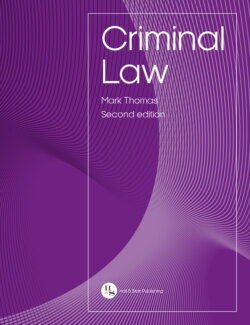Читать книгу Criminal Law - Mark Thomas - Страница 111
На сайте Литреса книга снята с продажи.
2.7.3.2Act of a third party
ОглавлениеA matter that has come before the courts on a number of occasions is the issue of a subsequent intervention by a third party. As you can imagine, it would be extremely unlikely (and often impossible) for a defendant to break his own chain of causation. In the event that the defendant did break his own chain of causation, he would remain liable for the offence in question, but the focus of the prosecution’s case would shift from the original act to the subsequent act. This is more a matter of evidence than it is of practice or liability. As a result, this section is only concerned with the acts of third parties.
in practice
When considering whether the act of a third party broke the chain of causation, the prosecution may decide that it is appropriate to seek a charge against that third party. However, in problem questions, unless it tells you otherwise, only the liability of the defendant concerned should be considered. The actions of the third party are therefore relevant only to the liability, or lack thereof, of the defendant in question.
As a starting point, it is necessary to set out the test to be applied. According to R v Kennedy (No 2) [2008] 1 AC 269, the act of a third party will only break the chain of causation where:
(a) the third party’s act is ‘free, deliberate and informed’; and
(b) the defendant is no longer the ‘substantial and operating cause’.
